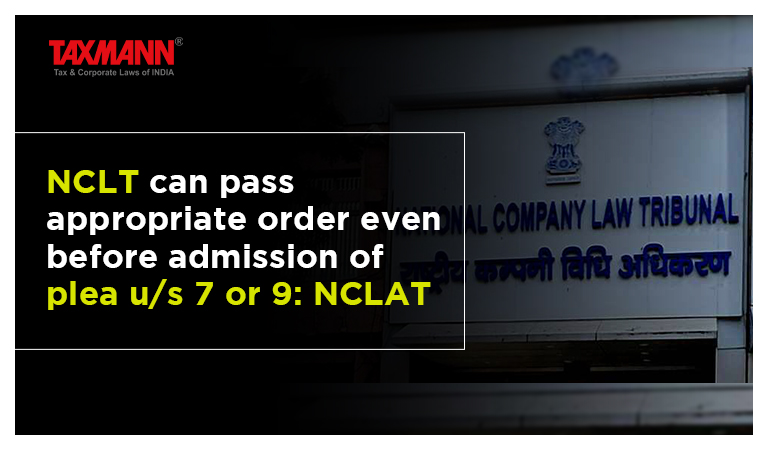NCLT can pass appropriate order even before admission of plea u/s 7 or 9: NCLAT
- Blog|News|Insolvency and Bankruptcy Code|
- 3 Min Read
- By Taxmann
- |
- Last Updated on 24 June, 2022

Case Details: Yes Bank Ltd. v. Dewan Housing Finance Corporate Ltd. - [2022] 139 taxmann.com 222 (NCLAT-New Delhi)
Judiciary and Counsel Details
-
- Justice Ashok Bhushan, Chairperson, Dr Ashok Kumar & Dr Alok Srivastava, Technical Member
- Shyam Divan, Gopal Jain, Sr. Advs., Raunak Dhillon, Isha Malik, Nihaad Dewan, Sgreeyash Lalit & Shashank Agarwal, Advs. for the Appellant.
- Ramji Srinivasan, Sr. Adv., Ms Srishti Kapoor, Ms Pooja Mahajan, Savan Mahajan, Simarpal Singh Sawhney, Giriraj Subrmanium & Abhishek Choudhary, Advs. for the Respondent.
Facts of the Case
In the instant case, the respondent financial creditor had extended a certain ‘Credit Facility to the corporate debtor. Appellant-bank had also extended ‘financial facility’ to the corporate debtor.
The appellant issued a ‘loan recall’ notice due to the defaults committed by the corporate debtor and issued a demand notice under section 13(2) of the SARFAESI Act, 2002 to the corporate debtor. By said notice, the appellant called upon the borrower to pay the bank dues within a period of 60 days from the date of notice together with interest.
The respondent’s financial creditor filed a petition under section 7 for initiation of the Corporate Insolvency Resolution Process against the corporate debtor. The application was listed before the Court.
In consequence of the notice under section 13(2) of the SARFAESI Act, 2002, the appellant issued a Possession notice under section 13(4) of the 2002 Act, and the possession was claimed to have been taken by the appellant. Thereafter an application was filed by the financial creditor under section 7 praying for restraining the corporate debtor and the appellant from selling, alienating, or creating any 3rd party rights on the assets of the corporate debtor.
The Appellant filed an application for vacating ex parte impugned order and the Adjudicating Authority by the impugned order continued the status qua order. The appellant preferred an appeal contending that before admission of an application under section 7, the Tribunal had no jurisdiction to pass any injunction order.
NCLAT Held
The NCLAT observed that the Adjudicating Authority had taken into consideration taking possession by the appellant before the expiry of 60 days. The possession having not been taken in accordance with the law, the title of the property still vests in the corporate debtor, which needs to be protected to safeguard the interests of the corporate debtor as well as other creditors.
“The Order passed by the Adjudicating Authority indicates that the status quo order had been continued till the next date of hearing. Therefore, it was not necessary to express any final opinion regarding the various issues raised by the parties regarding title and ownership of the immovable properties whether it was still in the ownership of the corporate debtor or stand transferred to the applicant Bank. All these issues had to be considered and decided by the Adjudicating Authority finally. The Adjudicating Authority had only continued Interim Injunction till the next date of hearing fixed before the Adjudicating Authority. There was no ground to interfere with the order at this stage.”,
ruled NCLAT
List of Cases Reviewed
-
- Deewan Housing Finance Corporation Ltd. v. Nayati Healthcare & Research NCR (P.) Ltd. [2022] 139 taxmann.com 221 (NCLT – New Delhi) (para 17) affirmed [See Annex].
List of Cases Referred to
-
- Hindon Forge (P.) Ltd. v. State of U.P. [2018] 99 taxmann.com 76/150 SCL 566 (SC) (para 9)
- NUI Pulp and Paper Industries (P.) Ltd. v. Roxcel Trading GMBH [2019] 108 taxmann.com 356/155 SCL 462 (NCL-AT) (para 13).
Disclaimer: The content/information published on the website is only for general information of the user and shall not be construed as legal advice. While the Taxmann has exercised reasonable efforts to ensure the veracity of information/content published, Taxmann shall be under no liability in any manner whatsoever for incorrect information, if any.

Taxmann Publications has a dedicated in-house Research & Editorial Team. This team consists of a team of Chartered Accountants, Company Secretaries, and Lawyers. This team works under the guidance and supervision of editor-in-chief Mr Rakesh Bhargava.
The Research and Editorial Team is responsible for developing reliable and accurate content for the readers. The team follows the six-sigma approach to achieve the benchmark of zero error in its publications and research platforms. The team ensures that the following publication guidelines are thoroughly followed while developing the content:
- The statutory material is obtained only from the authorized and reliable sources
- All the latest developments in the judicial and legislative fields are covered
- Prepare the analytical write-ups on current, controversial, and important issues to help the readers to understand the concept and its implications
- Every content published by Taxmann is complete, accurate and lucid
- All evidence-based statements are supported with proper reference to Section, Circular No., Notification No. or citations
- The golden rules of grammar, style and consistency are thoroughly followed
- Font and size that’s easy to read and remain consistent across all imprint and digital publications are applied



 CA | CS | CMA
CA | CS | CMA
